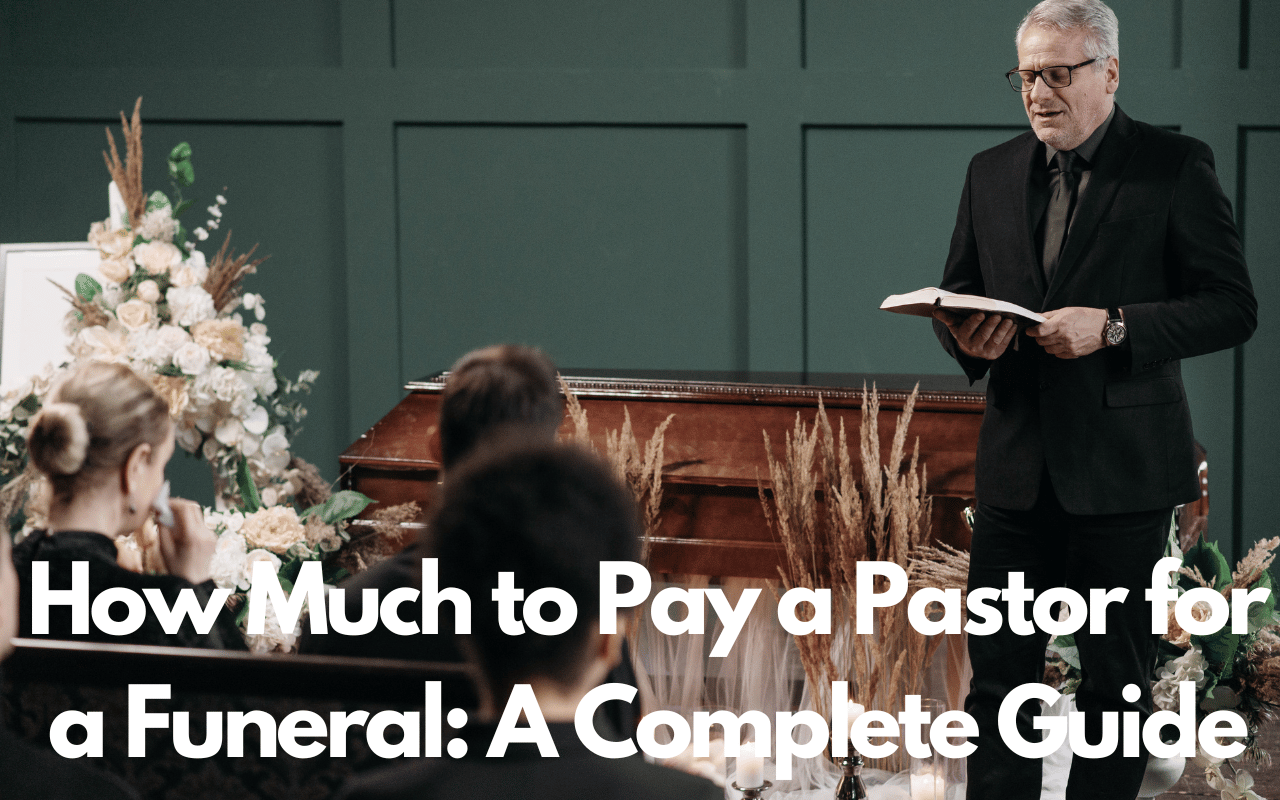How to Pay a Pastor: Honoring Spiritual Guidance with Proper Compensation

Navigating the financial aspects of compensating a pastor can be a delicate journey, balancing respect for their spiritual guidance with the practicalities of monetary transactions. It’s not just about acknowledging their dedication; it’s also about adhering to legal standards and ensuring fairness. Whether you’re part of a church board or an individual seeking guidance on how to properly remunerate a pastor’s service, understanding the nuances of payment, including tax implications and appropriate compensation models, is crucial. In this article, we’ll delve into the best practices for paying a pastor, ensuring that their spiritual support is met with the financial respect it deserves. 🙏💼
- How to Pay a Pastor: Honoring Spiritual Guidance with Proper Compensation
- How Should Pastors Be Paid?
- What Does The Bible Say About Paying The Pastor?
- Who Decides How Much A Pastor Gets Paid?
- How Many Hours Should A Pastor Work?
- Do Pastors Pay Taxes?
How Should Pastors Be Paid?
Determining fair compensation for ministers is a complex task for churches. Scripture underscores the obligation to support those proclaiming the gospel (1 Corinthians 9:14). The OPC Committee on Ministerial Care provides an online tool to assist churches in evaluating pastoral compensation. It factors in benefits, years of experience, and family size, adhering to biblical principles. The tool includes calculations for housing allowance, health insurance, and retirement contributions, offering a comprehensive perspective. However, it acknowledges the nuanced nature of compensation decisions, emphasizing the need to consider local circumstances and budgets. The tool serves as a guide, promoting thoughtful consideration of salary and benefits for pastors.
What Does The Bible Say About Paying The Pastor?
1 – 2 Thessalonians 3:7-10
The Apostle Paul emphasizes the importance of imitating his work ethic and not being idle. While he had a tent-making job to avoid burdening the church, it’s evident that this was not the ideal situation. The verses underscore that pastors deserve fair compensation, and congregations should allocate a portion of their tithe for the pastor’s salary.
2 – 1 Corinthians 9:9-14
Paul refers to the Law of Moses, stating that those who work spiritually should reap material benefits. He argues that pastors should receive fair compensation for their spiritual work. By referencing temple service and altar duties, he supports the idea that those proclaiming the gospel should earn a living from it.
3 – Luke 10:7
This verse straightforwardly asserts that laborers deserve their wages. Pastors, engaged in various responsibilities from counseling to sermon preparation, should be fairly compensated for their extensive work hours.
4 – Philippians 4:16-19
Paul commends the Philippians for their generous support, emphasizing the positive impact of compensating pastors. The passage encourages congregations to contribute to their pastor’s needs, creating a mutually beneficial relationship.
5 – Acts 6:2
Though not explicitly about payment, this verse implies that pastors should not be diverted from preaching to serve tables. Pastors need financial support to dedicate themselves fully to pastoral ministry, ensuring the congregation receives their undivided attention.
Who Decides How Much A Pastor Gets Paid?
The decision on how much a pastor gets paid typically falls to the church’s governing body, which might be a board of elders, a finance committee, a vestry, or a similar group depending on the denomination and church structure. In some cases, especially within larger denominations, there may be guidelines or scales for pastoral compensation that take into account factors such as the size of the congregation, the cost of living in the area, the pastor’s education, experience, and the scope of their responsibilities.
Here’s a breakdown of how the process often works:
- Church Governing Body: The board or committee responsible for financial decisions will discuss and decide on compensation. They may negotiate directly with the pastor or set a package based on predefined criteria.
- Denominational Guidelines: Some denominations provide guidelines to help standardize compensation across their churches. These guidelines can include salary ranges and recommendations for benefits and allowances.
- Compensation Studies and Surveys: Churches may participate in or refer to compensation studies and surveys that provide insight into what pastors are paid in different regions and church sizes.
- Budget Considerations: The church’s overall budget is a significant factor. The ability to pay a pastor adequately must be balanced with other financial responsibilities of the church.
- Pastor’s Needs and Qualifications: The pastor’s living expenses, family needs, educational background, and experience are also considered when determining fair compensation.
- Legal Requirements: Churches must comply with tax laws and employment standards, which can influence the structure of the compensation package.
- Congregational Input: In some churches, particularly smaller congregations, the entire congregation may have a say in the pastor’s compensation, either directly or through a voting process.
It’s important for the decision to be made transparently and fairly, ensuring that the pastor is supported in a way that reflects their value to the community while also maintaining the financial health of the church.
How Many Hours Should A Pastor Work?
In the realm of business, the standard expectation is a 40-hour workweek, often adhering to a predictable schedule, such as weekdays from 8 am to 5 pm. However, the landscape for pastors differs significantly. Pastors, functioning as religious professionals, don’t conform to traditional hourly employee norms. Their commitment extends beyond the clock, requiring them to work until their responsibilities are fulfilled. This can translate to an estimated workload of 50 to 65 hours per week.
For the context of this discussion, we’ll consider a full-time commitment as 40 hours per week, acknowledging the likelihood of professionals investing an additional 10-25 hours weekly. The regular 40 hours are typically scheduled, encompassing office hours, worship services, meetings, and more. The extra 10-25 hours remain unscheduled, contingent on the demands of the role. Here’s a rough breakdown:
– Full-time = 40 hours per week of “regular” hours + 10-25 additional unscheduled hours
– 3/4-time = 30 hours per week of “regular” hours + 10-20 additional unscheduled hours
– 1/2-time = 20 hours per week of “regular” hours + 10-15 additional unscheduled hours
Pastors often gauge their workload in terms of days worked per week. A full-time pastor typically dedicates six days a week to their role, with one full day off, commonly on Fridays or Mondays. Saturdays may not always be working days, but pastors are frequently engaged in special events. Sundays are almost universally workdays, with vacation days often determined by Sundays. Part-time pastors enjoy more days off, aligning with the following model:
– For 3/4 time, 2 days per week are off.
– For 1/2 time, 3 days per week are off.
It’s crucial to recognize that there’s no one-size-fits-all model for every situation. The decision to call a part-time pastor should be a collaborative effort involving a call committee, council, and the pastor. Congregations must be mindful that opting for a part-time pastor entails embracing a distinct model of ministry.
Do Pastors Pay Taxes?
Yes, pastors do pay taxes, but their tax situation can be unique due to the nature of their work and the way their compensation is structured.
Here are some key points regarding pastors and taxes in the United States:
- Income Tax: Pastors are required to pay income tax on their salaries. However, they can often designate a portion of their salary as a housing allowance, which can be exempt from income tax if used for housing-related expenses and within IRS guidelines.
- Self-Employment Tax: Pastors are considered self-employed for Social Security and Medicare taxes. This means they pay the self-employment tax rate on their income, including their housing allowance, unless they have applied for and received an exemption.
- Exemption from Self-Employment Tax: Some pastors may qualify for an exemption from self-employment tax if they have taken a vow of poverty or if they object to public insurance due to religious reasons. To claim this exemption, they must file Form 4361 with the IRS and meet specific criteria.
- Withholding Taxes: Unlike typical employees, taxes are not automatically withheld from a pastor’s paycheck. Pastors must either request that their church withhold taxes or make quarterly estimated tax payments to cover their tax liability.
- Housing Allowance: The housing allowance is a significant tax consideration for pastors. While it can be exempt from income tax, it must still be included when calculating self-employment taxes, unless exempted.
- Dual Tax Status: Pastors often have a dual tax status, where they are considered employees for federal income tax purposes but self-employed for Social Security and Medicare purposes. This can complicate their tax filings.
- Tax Benefits: Pastors may be eligible for certain tax benefits, such as a parsonage provided by the church, which can be used tax-free for housing expenses.
- Reporting Requirements: Pastors must report their income and expenses related to their ministry on their tax returns, often using Schedule C of Form 1040 to report self-employment income.
It’s important for pastors to seek professional tax advice to navigate their complex tax situation effectively. Tax laws can vary by country, and in the United States, they can also vary by state, so pastors should consult with a tax professional who is knowledgeable about the specific tax regulations that apply to clergy.






